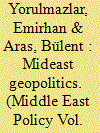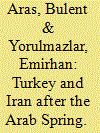|
|
|
Sort Order |
|
|
|
Items / Page
|
|
|
|
|
|
|
| Srl | Item |
| 1 |
ID:
154311


|
|
|
| 2 |
ID:
149443


|
|
|
|
|
| Summary/Abstract |
State failure, sovereignty disputes, non-state territorial structures, and revolutionary and counter-revolutionary currents, among others, are intertwined within the Arab Spring process, compelling old and emerging regional actors to operate in the absence of a regional order. The emergent geopolitical picture introduces the poisonous mix of loss of state authority spiralling toward instability, defined by sectarianism, extremism, global rivalries, and ultimately irredentism within interdependent subregional formations. This assertion is substantiated by detailed and specific evidence from the shifting and multi-layered alliance formation practices of intra- and inter-state relations, and non-state and state actors. Analysis of the relations and alliances through a dichotomous flow from domestic to regional and regional to global also sheds light on prospective future order. A possible future order may take shape around a new imagination of the MENA, with porous delimitations in the form of emerging subregions.
|
|
|
|
|
|
|
|
|
|
|
|
|
|
|
|
| 3 |
ID:
136209


|
|
|
|
|
| Summary/Abstract |
When the political landscape in the Middle East appeared on the brink of transforma
tion back in early 2011, Turkey and Iran, for different reasons, were delighted. Each envisioned an exten¬sion of ito national sphere of influence. Both Ankara and Tehran declared them¬selves the standard bearers for "demo¬cratic" rule and civilian empowennent. For Ankara, this regional transformation was, in the words of Foreign Minister Ahmet Davutoglu, a “normalization" process —a quest for good governance and integra¬tion into the international community. The tide was thought to be turning towards the eclectic Turkish model, a combination of local traditions with the universal practices of democracy, humen rights and a market economy. A series of early events seemed confirm that the Turkish model for po-litical conciliation and regional economic integration wu emerging the new politi¬cal none in the Middle East.
|
|
|
|
|
|
|
|
|
|
|
|
|
|
|
|
|
|
|
|
|